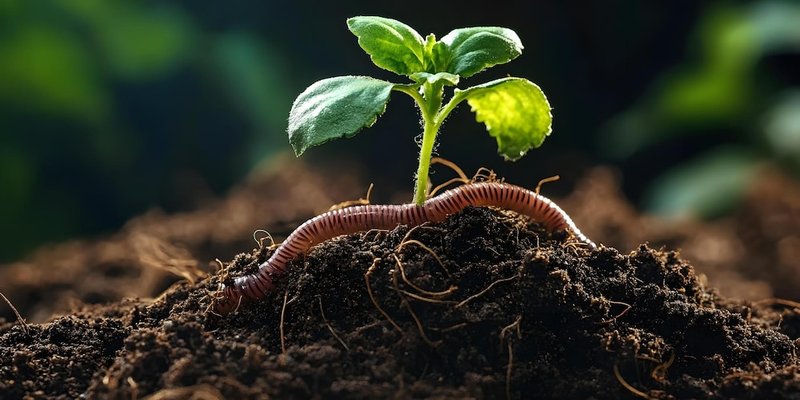
When it comes to root development in plants, earthworms enhance this process in remarkable ways. They break down organic matter, aerate the soil, and even help with nutrient distribution. So, if you’ve ever marveled at your garden’s lush plants, you can thank these wiggly friends for their hard work. Let’s dig deeper into how earthworms affect root development in plants, and why it truly matters.
Understanding Earthworms and Their Habitat
Earthworms are fascinating little creatures. They thrive in moist, organic-rich environments, usually found in garden soil, forests, and even agricultural fields. These worms can tunnel up to six feet into the ground, creating a network of channels that help with water drainage and air circulation. You might wonder why this is important. Well, plants need not just nutrients but also air and water to grow strong roots.
When earthworms dig through the soil, they carry organic material down with them. Think of it as them bringing snacks to the underground party for plant roots. The decaying leaves, grass clippings, and other organic matter help create a nutrient-rich environment that’s vital for root development. This naturally leads to stronger and healthier plants.
Another cool thing is that earthworms help improve soil structure. Their constant movement and the way they process organic matter create a crumbly, loamy texture. This type of soil can hold moisture while still allowing excess water to drain away. Healthy roots need this balance!
The Role of Earthworms in Nutrient Cycling
Nutrient cycling is a fancy way of saying that nutrients move through an ecosystem, making their way from the soil to plants and back again. Earthworms play a vital role in this process. They consume organic matter and break it down into simpler compounds. This helps release essential nutrients like nitrogen, phosphorus, and potassium into the soil, making them more available for plant uptake.
Imagine your favorite dish. You wouldn’t want the ingredients to sit around without being mixed or cooked; they need to be transformed into something delicious and nourishing. Earthworms do this transformation by digesting organic matter and excreting nutrient-rich castings. These castings are often called “black gold” by gardeners and farmers because they enrich the soil and promote root growth.
Moreover, the presence of earthworms in the soil also increases microbial activity. Just like a bustling kitchen needs plenty of cooks, plants thrive with a team of helpful microbes. These microbes further break down organic material and contribute to nutrient availability, creating a positive feedback loop that supports robust root development.
Improving Soil Aeration through Tunneling
Soil compaction can be a real problem for plants. When soil is too dense, roots struggle to grow and access water and nutrients. Earthworms tackle this issue head-on with their tunneling habits. As they wiggle and burrow, they aerate the soil, creating pathways that allow water and oxygen to reach plant roots more easily.
Think of earthworm tunnels as highways in the soil. Without these highways, it would be like trying to navigate a city with no roads! The tunnels also help rainwater soak into the ground instead of running off, which is crucial during dry spells. Plant roots depend on this steady moisture supply for growth.
Additionally, as earthworms move through the soil, they help break up clumps and improve its texture. This means that roots can spread out more easily, searching for nutrients and water. The more room roots have to explore, the healthier the plant will be.
Enhancing Soil Structure and Retention
The structure of the soil plays a critical role in how well plants grow. Earthworms contribute to an ideal soil structure by mixing organic and inorganic materials through their activities. Their castings help bind soil particles together, creating aggregates that improve soil porosity and water retention.
Imagine filling a sponge with water. If the sponge has holes and is structured well, it holds water effectively. Similarly, when soil has good structure, it retains moisture without becoming waterlogged, which is vital for healthy root systems.
This improved soil structure also has long-term benefits. Plants that have space to grow strong roots are better equipped to weather droughts, pests, and diseases. By making the soil healthier, earthworms help ensure that plants thrive in a variety of conditions.
The Symbiotic Relationship Between Earthworms and Plants
The relationship between earthworms and plants is a classic example of symbiosis. This means both parties benefit from each other’s presence. Plants provide organic matter as food for earthworms, and in return, earthworms help enhance soil quality and nutrient availability for plants.
You might think of it like a friendship—each side brings something valuable to the table. Plants gain access to better nutrients and aerated soil, while earthworms enjoy a steady supply of food. This mutual reliance contributes to a healthy ecosystem, where plant roots can grow strong and support vibrant plant life.
This relationship becomes even clearer when considering how plants respond to earthworm activity. Studies have shown that plants in soils rich in earthworm activity tend to have better root systems compared to those in less active soils. When you see your plants flourishing, remember that those earthworms are working hard behind the scenes.
In summary, earthworms are unsung heroes in the world of plant growth. They improve nutrient cycling, enhance soil aeration, and promote better root development. For gardeners and farmers alike, understanding the role of earthworms can lead to better planting and cultivation practices.
If you want your plants to thrive, think about creating a welcoming environment for these little creatures. You can add organic matter like leaves or compost to your soil, encouraging earthworms to move in. Remember, a healthy garden or farm isn’t just about the plants; it’s about the entire ecosystem that supports them. So, the next time you spot an earthworm, give it a nod of appreciation for the hard work it’s doing to help plants grow!
